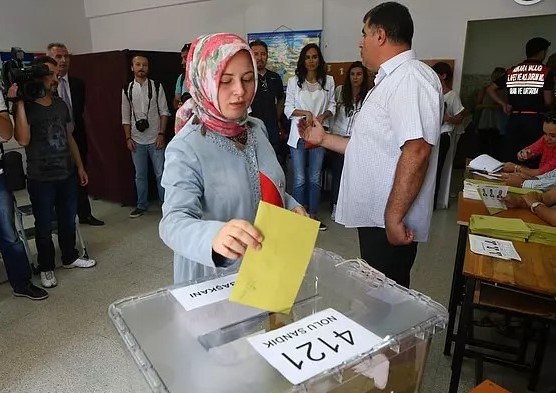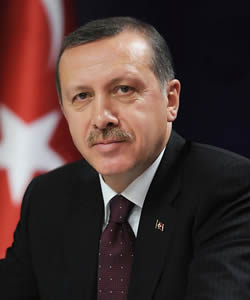As the masses of Pakistan struggle to pick the debris of an uncalled for, month long, political crisis that literally paralyzed the people and economy in a number of major urban centres, there is a refreshing breeze from our brotherly county—Turkey. Over the years, Turkey has been able to evolve an enviable model of political stability, robust economic growth, smooth transitions and continuity. After completing his three terms of premiership, Turkish Prime Minister Recep Tayyip Erdogan has won his country’s first direct presidential election.
Once Tayyip took over as Prime Minister, Turkey was suffering from all the evils which today characterize Pakistan’s fractured state and society; during his tenure, Turkey has indeed turned the corner and now it is one of the modern and forward looking polities of the world—with robust economy, independent foreign policy and enviable political stability.
After the provisional results of presidential elections were announced Mr Ihsanoglu, joint candidate for the two main opposition parties, said: “I congratulate the prime minister and wish him success.” In his victory speech Erdogan gave a message of unity by calling for societal reconciliation: “Let’s leave the old discussions in the old Turkey…I will embrace all 70 million [Turks] as president…Lets start a new social reconciliation period today…” It is Erdogan’s ninth consecutive election victory including referendums and municipal polls. His switching of role will ensure continuity of policies and give boost to the country to sustain itself as a modern state.
Erdogan has built his popularity on economic growth, popular foreign policy and reforms that have turned Turkey into a regional powerhouse. Erdogan is revered by supporters for boosting the economy and giving a voice to conservatives. Wedged between the turmoil of Iraq, Syria and Ukraine, Turkey has been treading cautious path to avoid getting embroiled in the wider conflict. Erdogan’s people know better that he is the one to hold them all together and prevent ISIS from infiltrating them. His bold policy towards Palestine and Afghanistan has also added to his popularity.
Underpinning Erdogan’s electoral success was his strong support among moderate Muslims, many of whom have joined the ranks of a burgeoning middle class as nominal annual incomes tripled to US$10,000 per capita during his reign. His government has raised the status of religious high schools and allowed head scarves for women in state universities and in most public offices. “He met my expectations to this day, his vision and stance are very close to mine, and I’m very happy with all the services, “I’ll keep voting for Erdogan and his party as long as they maintain this.” said Aysenur Celik, a 26-year-old clothes designer after casting her vote. In a tea house in the working-class Istanbul district of Tophane, men watching election coverage on television praised Erdogan as a pious man of the people who had boosted Turkey’s status both economically and on the international stage.“Erdogan is on the side of the underdog. He is the defender against injustice. While the Arab world was silent, he spoke out against Israel on Gaza,” said Murat, a jeweler. “This country was ruined by the old politicians. They lied to us. They caused economic crises, the PKK violence,” he added. Erdogan has opened a peace process with Kurdish PKK militants to end a conflict which has killed 40,000 people in 30 years. Moreover, Turkey’s military has been sidelined from its traditional role in politics.
After safely sweeping the presidency, Erdogan’s attention will now turn to his choice of prime minister, which analysts say is likely to be a malleable loyalist to maintain control over his political party. Previous prime ministers who left parliament for the presidency, such as Suleyman Demirel and Turgut Ozal, overestimated the loyalty and unity of their parties and failed to retain control.
With a young, well educated, qualified and competitive workforce, important domestic market, competitive and dynamic private sector, highly developed technological infrastructure in transportation, telecommunications and energy sectors; being an energy terminal and corridor in Europe, Asia, Middle East and the Mediterranean, connecting East and West, having a Customs Union with the EU and being an accession country to the EU, Turkey is a rising economic powerhouse and a strong emerging power in the global economy. Turkish membership in regional organizations such as Black Sea Economic Cooperation (BSEC), Developing Eight (D-8), and Economic Cooperation Organization (ECO) are a reflection of the multi-pronged character and regional orientation of Turkish foreign policy in the economic sphere. On the other hand, its membership in G-20 is an indicator for its growing role as a responsible stakeholder in the global economic governance. As an active participant in the international development cooperation process, Turkey hosted the 4th UN Conference on the Least Developed Countries on 9-11 May 2011; “Istanbul Action Programme” was adopted by which the international community endorsed its cooperation and partnership commitment towards the least developed countries.

Turkish economy has achieved an outstanding performance with its steady growth over the last 10 years. Sound macroeconomic strategies, prudent fiscal and monetary policies, structural reforms that the Turkish government has been pursuing in the last decade resulted in high rates of growth and increased confidence in the Turkish economy. Accordingly, while Turkish GDP stood at 231 billion USD in 2002, it rose to 820 billion USD at the end of 2013. Concurrently, GDP per capita soared to 10,800 USD from USD 3,500 in 2002. As such, the Turkish economy is the 17th largest in the world and the 6th largest in Europe.
Whereas many developed countries are afflicted with the aftershocks of the global economic crisis, Turkish economy expanded by 9.2 percent in 2010, and 8.5 percent in 2011, thus standing out as the fastest growing economy in Europe, and one of the fastest growing economies in the world. Given that EU economies are stagnating, the Turkish economic performance is noticeable.
Turkish private sector has made progress to open up to the world markets. Turkish contractors have undertaken 6700 projects in 102 countries with a total value of US$D 274 billion. At present 38 Turkish companies are included among the “Top 250 International Contractors List” with an annual turnover of US$ 315 billion in 2013. Structural reforms in the last decade have improved the investment climate which in turn attracted Foreign Direct Investment (FDI). Turkey received US$ 14,8 billion worth of foreign direct investment between 1980-2002, whereas it has attracted US$1363 billion worth of investment during the 2003-2013 period. Currently more than 30000 companies with international capital are registered in Turkey.
In parallel with stable economic growth, Turkey has also reined in its public finances; ratio of public debt to the GDP contracted to around 33 percent in 2013. Turkey has been meeting the 60 percent threshold of Maastricht criterion for public debt stock since 2004. Similarly, the budget deficit decreased to 1.2 percent of GDP. Turkey lowered unemployment ratio to below 10 percent in an atmosphere of global economic crisis. While Turkish exports were around US$36 billion in 2002, it reached US$ 152 billion in 2013. Turkey has successfully diversified its trade destinations all over the world. As of 2013, more than 4000 Turkish companies have invested around US$30 billion abroad. This indicates the resilience of the Turkish economy and the efficiency of the investment policy.
To mark the 100th anniversary of the Republic, “Vision 2023” sets out ambitious but attainable goals. Turkey aims at being among the top 10 economies in the world with US$ 2 trillion GDP, and US$ 25000 USD GDP per capita income, US$ 500 billion exports, and 10 globally-known national brands. Turkish experience has once more endorsed that political stability and macroeconomic prudence are essential for sustainable growth. Any one listening in Pakistan!




